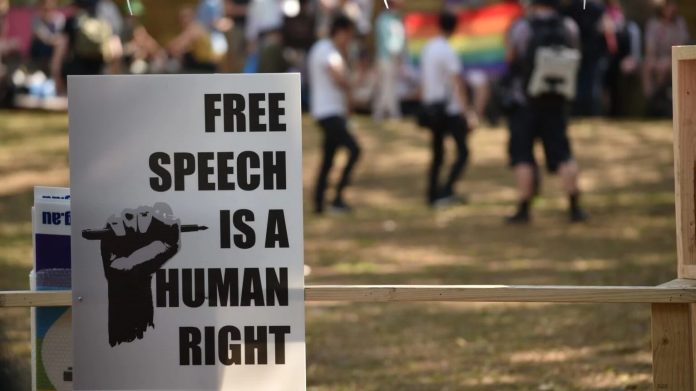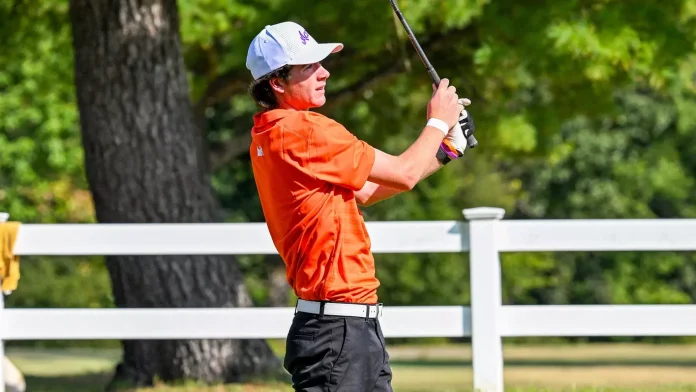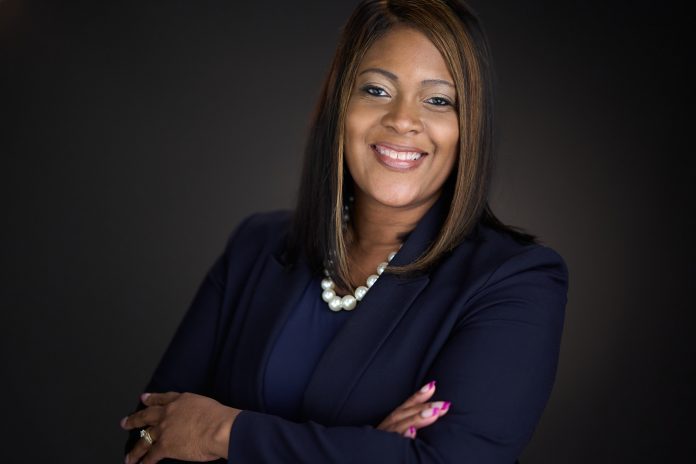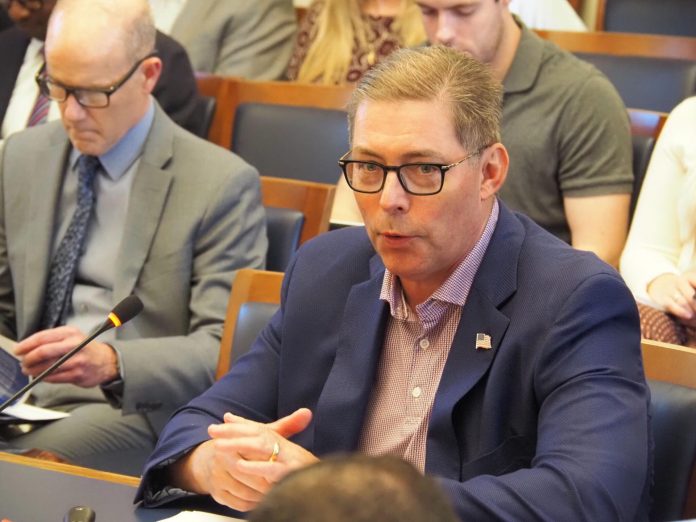ACLU, free speech experts warn about “chilling” effect as Gov. Mike Braun links teachers’ licenses to social media posts.
Indiana Gov. Mike Braun warned Wednesday that teachers who post online in celebration of political violence could face suspension or even revocation of their professional licenses. But free speech advocates quickly raised concerns that the governor’s threat risks trampling constitutional protections and chilling lawful speech.
“Teachers play a critical role in the shaping of our youth,” Braun wrote in a post to X. “As a result, we hold them to a higher standard. The vast majority of Indiana’s educators live up to that standard; but sadly, in recent days a few have not.”
Braun’s comments followed the assassination of Charlie Kirk, a prominent conservative activist who was killed at a college speaking event in Utah last week. The Republican governor said disagreement on political issues “should never lead to the type of horrific tragedy we witnessed last week.”

“There have been some terrible things shared, particularly across social media,” Braun wrote, referring to online discourse about Kirk’s death. “While we must protect the First Amendment, calls for political violence are not freedom of speech and should not be tolerated.”
Braun emphasized that Indiana’s Secretary of Education “has the authority to suspend or revoke a license for misconduct and the office will review reported statements of K-12 teachers and administrators who have made statements to celebrate or incite political violence.”
David Keating, president of the Institute for Free Speech, said that threat raises “serious” constitutional concerns.
“My initial reaction was, I don’t understand why he would call for suspending, like revoking, a teacher’s license,” Keating said. He noted that Indiana law typically ties license revocations to criminal acts or serious misconduct.
State and school officials “would be totally justified, in many situations,” to cancel a teacher’s contract, Keating added, “but I just think it’s a tougher thing to go and revoke a license.”
He also pushed back on Braun’s claim that “calls for political violence are not freedom of speech.”
“That’s actually not true,” Keating said. “You are allowed to call for violent overthrow of the government. You’re allowed to even call for assassinations. Obviously, this is not the sort of thing that you want an elementary school teacher to have in their background. But I don’t think it meets the standards for a license revocation.”
Licenses under review?
It remains unclear whether any licensure reviews are already underway in Indiana, however.
The Indiana Department of Education — helmed by Secretary of Education Katie Jenner — “does not comment on open investigations or during the pendency of administrative proceedings,” said agency spokesperson Courtney Bearsch in a Thursday statement to the Indiana Capital Chronicle.
“IDOE is aware of social media comments made by a small number of Indiana educators following the assassination of Charlie Kirk and is reviewing each matter accordingly,” Bearsch said. “These isolated comments do not represent Indiana educators as a whole, the vast majority of which hold themselves to the highest professional standards and work diligently to model good citizenship.”
She explained that — upon being notified of a complaint against an educator — IDOE “investigates to determine whether the facts meet the statutory threshold for suspension or revocation.”
If the facts are “sufficient to satisfy statute,” a formal complaint is then filed with the Office of Administrative Law Proceedings, initiating the administrative process. Under state statute, OALP serves as the final administrative authority in issuing an order on an educator’s license.
IDOE maintains a public database of educators who have been disciplined, most often for criminal convictions. As of Thursday, no license suspensions or revocations had been recorded in the database since Aug. 25.

At least 25 licenses have been revoked since Jan. 1 — most of which were for offenses by educators and school employees who were convicted of one or more of 37 serious felonies that are listed in state statute. Conviction is automatic grounds for a license to be revoked.
Aside from criminal offenses, seven educator licenses were revoked since the start of the year for “immorality” and one for “misconduct,” according to IDOE.
There are more than 230,000 licensed teachers in the state of Indiana.
Stevie Pactor, an attorney with the ACLU of Indiana, warned that Braun’s threat could have broad implications for teachers’ speech.
“Teachers still have First Amendment rights when they’re talking as private citizens about matters of public concern on their social media or anywhere else,” Pactor said. “This idea of chilling their speech is absolutely where my mind went to.”
She pointed to a line from a 1978 U.S. Supreme Court ruling, which asserted that “The First Amendment needs breathing space to survive.”
“If I were a K-12 educator, I would absolutely be very, very cognizant of what I was putting on social media in this climate, and to a degree that’s not really justified by what the law allows,” Pactor continued. “These posts are clearly their private speech. There’s no question that this is private speech.”
Indiana’s Constitution also has its own speech protections: “No law shall be passed, restraining the free interchange of thought and opinion, or restricting the right to speak, write, or print, freely, on any subject whatever; but for the abuse of that right, every person shall be responsible.”
What the law says — and what’s less clear
Indiana law gives state education officials authority to suspend or revoke a teacher’s license under limited circumstances.
The Department of Education is permitted by statute to take such action “upon the written recommendation of the state superintendent of public instruction” if a teacher is found guilty of “(1) immorality; (2) misconduct in office; (3) incompetency; or (4) willful neglect of duty.”
But because “immorality” is not defined in state code, how it applies to off-duty speech — especially speech on personal social media accounts — is open to interpretation, Keating said.
He cautioned that even the governor’s public threat could have consequences.
“Teachers face this kind of pressure for actually bringing up real issues of public concern,” he said, noting that off-duty speech cases are highly fact-specific and courts have often deferred to school districts. “Taking away their license — I mean, you look at the other standards for taking people’s licenses away. Those are by and large criminal convictions.”
The free speech expert noted, too, that the legal definition of incitement requires more than offensive online rhetoric.
“Some random person posting on social media — just for whoever out there might or might not be reading it — that’s not incitement,” Keating added, pointing to the U.S. Supreme Court’s Brandenburg test, which limits punishable incitement to speech likely to produce imminent lawless action.
State law also spells out what qualifies as “official misconduct.” According to Indiana Code, a public servant commits official misconduct if they knowingly or intentionally commit an offense while performing their official duties; solicit or accept unauthorized property in connection with their work; misuse nonpublic information for personal gain; or fail to turn over public records or property to a successor. The statute classifies the offense as a Level 6 felony.
Administrative rules also provide more detail on how the license review process works.
Under Indiana’s Administrative Code, a license suspension can last up to three years, while a revocation can extend for an indeterminate period. A teacher whose license is revoked has the ability to petition for reinstatement after three years.
State officials are required to consider several factors when reviewing a case or a reinstatement petition.
Those include whether the conduct adversely affected students or colleagues; how long ago the conduct occurred; whether the conduct is likely to recur; and whether denying reinstatement could “chill constitutional rights.” Officials are also directed to weigh evidence of rehabilitation, such as counseling or community service.
Proceedings to suspend or revoke a license are subject to public hearings and can take months or years to resolve.
If I were a K-12 educator, I would absolutely be very, very cognizant of what I was putting on social media in this climate, and to a degree that’s not really justified by what the law allows.
– Stevie Pactor, ACLU of Indiana attorney
Pactor underscored that the threshold for punishing speech is high.
“The school district, in order to prohibit or punish a teacher for their speech, can only do that if that speech would cause a significant disruption to the learning environment or impair the effective operation of the school or the school district,” she said. “And that’s a really high standard.”
She stressed that licensing actions face the same constitutional constraints as school discipline.
“All government action is subject to the same standard,” Pactor noted. “You know where the First Amendment says you’ve got to stop.”
If the state proceeds with discipline, Pactor said litigation is likely.
“I would certainly expect it to be challenged in court,” she said. “And of course, if any impacted government employee, including educators, believe that their First Amendment rights have been violated in any of these circumstances, they should absolutely contact us.”
A wave of scrutiny
Braun’s threat comes as other educators and public employees have already faced consequences for social media posts about Kirk’s killing.
Indiana’s Department of Child Services, for example, announced via social media on Sept. 13 that a worker was no longer with the agency after making a comment that was in poor taste and “does not reflect the values of this agency or the standards that have been set by this administration.” The agency later confirmed the employee resigned.
Since then, at Ball State University, a director of health promotion and advocacy was fired Wednesday after writing on Facebook that Kirk’s death “is a reflection of the violence, fear and hatred he sowed. It does not excuse his death, AND it’s a sad truth.”
The university said the statement was “inconsistent with the distinctive nature and trust” of her leadership role and had caused “significant disruption” on campus.
Meanwhile, Attorney General Todd Rokita has directed his office to investigate similar statements made by K-12 teachers. His “Eyes on Education” online portal — a site already used to collect complaints about schools — now features a section highlighting social media posts by educators that appear to justify or celebrate Kirk’s death.
Among those listed as of Thursday was a Riley High School teacher in South Bend, who allegedly wrote on Facebook, “I’m not saying it’s right, but I’m saying it’s only fitting.”
An Elkhart teacher was also flagged, prompting Elkhart Community Schools to circulate a letter reminding staff that online speech can significantly affect how the community views both individuals and the district.
The Indiana State Teachers Association condemned violence but warned Braun’s threat could chill lawful speech.
“ISTA condemns violence in all forms, including political violence. Indiana’s educators devote their lives to creating safe and welcoming classrooms, and the vast majority do so with professionalism, care and deep commitment to their students every day,” the state’s largest teachers union said in a statement Thursday. “While celebrating violence is unacceptable, threatening educators’ licenses for lawful speech risks silencing those who are teaching honestly or sharing personal view












